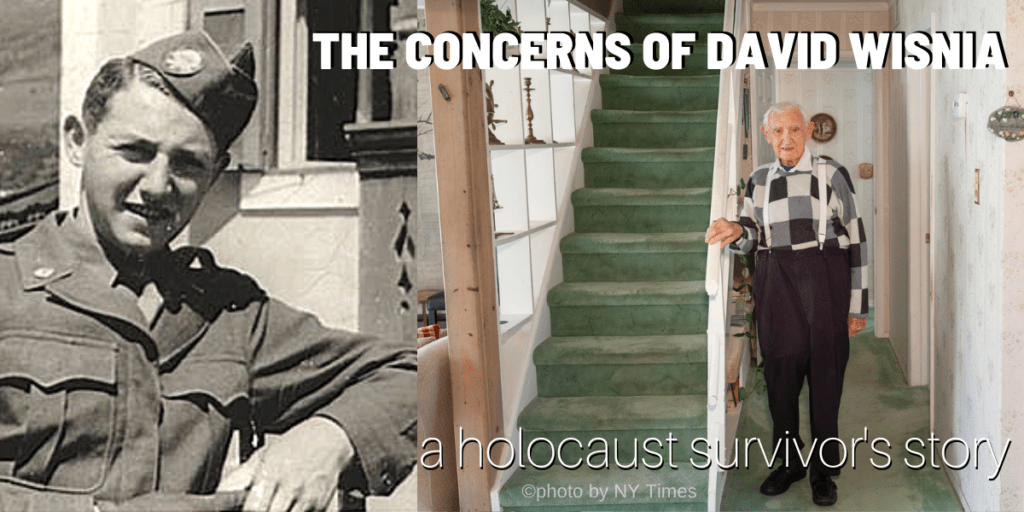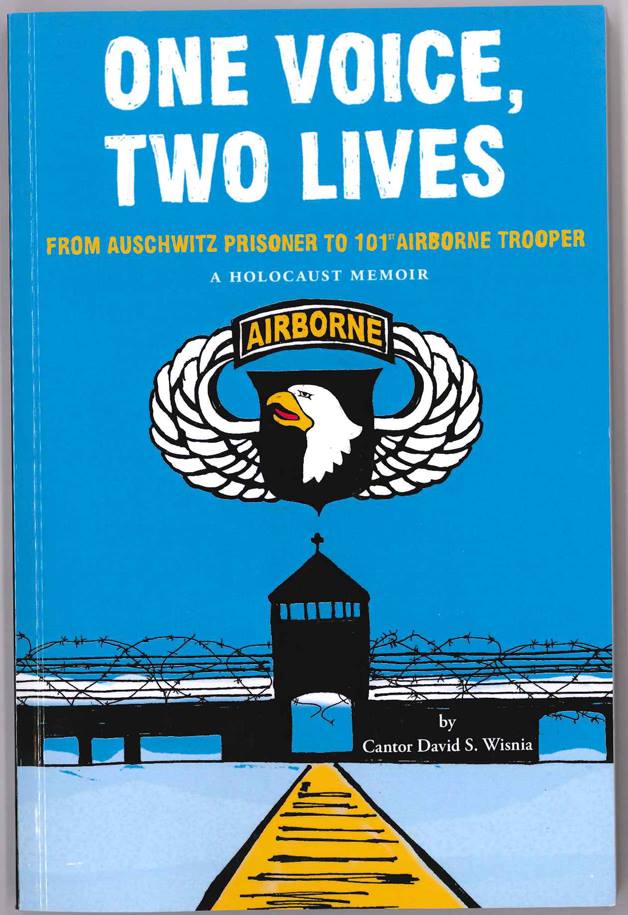
Avi Wisnia's Eulogy for His Grandfather Cantor David S. Wisnia
Congregation Rodeph Shalom in Philadelphia, August 2021
“It is very fitting to be in a grand sanctuary like this one today, because the sanctuary is one of the places where my grandfather was most at home. It is the heart of a synagogue where tradition and community combine with music.
Throughout all the different chapters of David Wisnia’s life, music is what bound it all together. Music made him a singing sensation as a young boy in Warsaw; music kept him alive in Auschwitz; and music sustained him as a cantor here in America. David Wisnia was always singing. Even if he was just calling you to make lunch plans, he would leave you a voicemail that always started with a melodious “helloooooooooooo” — like he was about to launch into that week’s torah portion.
Of course, to me, David Wisnia was much more than just a cantor. He was my Saba. He’s the one that would take me out to restaurants I could not afford when I lived in New York, he’s the one who would make me fresh-squeezed orange juice when I would visit him at his house in Levittown, he’s the one who taught me how to chant torah, the man who could recite the 13 verses of “Who Knows One” at the Passover seder in one breath, who brought our family together for the family reunions every year on his birthday – which came to be known as SabaFest.
Later in life, as we began making music together, I got to travel with him too. To Lewisburg and Margate; to Rockville MD and Lynchburg VA, to Tampa FL and Los Angeles. And wherever he went, Saba had this unique ability to charm every stranger, to make lifelong friends even on an overnight stay. To see this in action, – that everyone he came in contact with just fell in love with him – it was like magic.
Nowhere was this more evident than when we traveled together to Poland. It was not only his remarkable story of surviving the Holocaust that drew people to him,… it was the way he wanted to make you laugh, the way he wanted you to enjoy life with him, the way he loved being in your company.
For someone who so enjoyed being in the company of others, the pandemic was a particularly isolating and difficult time and it really took a toll on him, as it has on all of us. But I’m very grateful that before he passed away, we were able to get vaccinated and spend a few more quality moments together.
We had a standing date every Friday of the past few months. I would bring him Dunkin Donuts: a classic chocolate-frosted and a hot cuppa coffee. Of course, no matter how hot the coffee was, if it wasn’t scalding hot, unbearable for a normal human being, it wasn’t hot enough. So you put it in the microwave. Twice.
Towards the end, you could see that Saba was deteriorating fast. His body was failing him, it was harder for him to hear, and he didn’t speak much. Sometimes you didn’t even know if his mind was present. So, in addition to the donut, I started bringing something extra to try and stimulate conversation. On one of our last visits together, I pulled out a set of interview questions that had been sent to me by a 12-year-old student in California who had never met a Holocaust survivor. Saba was tired, but he welcomed the questions. He always had time for his students.
The questions started out easy: ‘Where did you grow up?’, ‘What do you do for a living?’,… and then: ‘Were you scared when you had to sing for the Nazis?’
I didn’t think Saba was going to answer something so personal, and I wasn’t sure he even heard the question. But then he answered.
“Yes. I was nervous.” And he started to tell this story which I had never heard him tell before in all his 94 years.
“When I was in Auschwitz and I was told to entertain, I constantly thought the Nazis were going to get rid of me after each song. It was a very scary feeling. But as a child, I sang solos in the adult choir in the great synagogue of Warsaw. So, I pictured myself on the bimah with the entire choir behind me, and seated in front of me were not the Nazis in that room, but my friends and schoolmates and my family. That’s what I pictured in my mind, and it took my fear away. I was singing to them.”
That is what my grandfather carried on his voice every time he sang. Saba was not always able to talk about what happened to him, and for as long as I knew him he was not really one to talk openly about his emotions and how he was feeling. But you could always hear it in his voice when he sang, you could always hear it in his music.
There are things I have learned from him, by listening to that voice: to care about what’s going on in the world, to stand up to injustice; i learned from him that all people are responsible for each other; and, that no matter what you have been through, it is always, always possible to move forward. I witnessed this first-hand when I saw my grandfather standing at the Death Gate of Auschwitz-Birkenau, 75 years after being imprisoned and tortured there, returning to sing in full voice no longer as a prisoner but as a survivor.
Music saved my grandfather’s life in the concentration camp, and it continued to, every single day of his life thereafter.
My grandfather has performed with so many talented and generous musicians over the years, his accompanists and colleagues, his choirs and his fellow clergy. And I would like to conclude by paying tribute to him with a recording from his time with his congregation at Har Sinai synagogue in Trenton NJ. This recording was put together by his longtime accompanist and friend Laurent Levy, and you’ll hear him accompanied on piano by Mark Sobel, and the temple choir. The song is a piece of liturgy called “R’tzei” asking God to hear our prayers. It has particular meaning because this song was taught to my grandfather by his mentor, the famous Cantor Gershon Sirota when Saba himself was a student in Poland. My grandfather used to sing it every Friday night at Shabbat services, and it became one of his signature pieces. When I think of Saba singing, I picture him in the sanctuary of Har Sinai where this song was recorded, a grand sanctuary like this one in Philadelphia, and like the one where he sang in Warsaw.
As we listen to this prayer, I invite you to think about the memories you have of Saba, of David Wisnia; the memories that you hold dear, however he touched your life, however you knew him. Let us be grateful that we had a chance to experience that David Wisnia magic.
For all the other things left unsaid, let us forever hear it in the music.”
Cantor David S. Wisnia has a remarkable voice, and he uses it to tell his remarkable story
He is fluent in multiple languages and received his vocal training in his native Poland as a student of renown Cantors Sirota and Koussevitsky. He served as Cantor of Temple Shalom in Levittown, PA for 28 years, and recently retired after 23 years as Cantor of Har Sinai Congregation of Trenton, NJ. David Wisnia is a member of the American Conference of Cantors within the UAHC, and continues to be an active vocalist, educator, and congregational community leader.
During World War II, when he was just a teenager, David became a prisoner of the infamous Auschwitz-Birkenau concentration camp, where he was held for nearly 3 years. After surviving several horrors in Auschwitz, David discovered that his singing voice would ultimately save his life. A daring escape lead him into the path of U.S. soldiers from the 101st Airborne who adopted “Little Davey,” taking him with them on their campaign of liberation through Europe. With their help, David Wisnia was able to immigrate to the United States. David’s story is unique: he is both a Holocaust Survivor and a WWII Liberator. (Abbreviated bio from David Wisnia’s blog)
2020 Note from Rabbi Haim Beliak
 Warm Regards and Best Wishes To David Wisnia — Well, but lonely in Senior Home. Recently, I spoke with Cantor David Wisnia’s grandson, Avi. Avi reports that his grandfather is doing as well as can be expected in the difficult circumstances of the COVOID 19 pandemic.
Warm Regards and Best Wishes To David Wisnia — Well, but lonely in Senior Home. Recently, I spoke with Cantor David Wisnia’s grandson, Avi. Avi reports that his grandfather is doing as well as can be expected in the difficult circumstances of the COVOID 19 pandemic.
We recall the memorable visits of Cantor Wisnia to Beit Warszawa and Warsaw and to Los Angeles for a series of fundraising concerts in Southern California. Recently, parts of David’s biography was captured in One Voice Two Lives: From Auschwitz Prisoner to 101st Airborne Trooper. This week an accompanying video overview of David’s life was produced.
Click here to watch: Holocaust Survivor’s Powerful Story | Memoirs Of WWII #25
